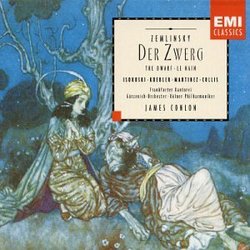| All Artists: Zemlinsky, Isokoski, Martinez, Collis, Kueber Title: Zemlinsky: Der Zwerg Members Wishing: 0 Total Copies: 0 Label: Emd Int'l Original Release Date: 1/1/2002 Re-Release Date: 11/5/2002 Album Type: Box set, Import Genre: Classical Styles: Chamber Music, Historical Periods, Classical (c.1770-1830) Number of Discs: 1 SwapaCD Credits: 1 UPC: 724356624726 |
Search - Zemlinsky, Isokoski, Martinez :: Zemlinsky: Der Zwerg
 | Zemlinsky, Isokoski, Martinez Zemlinsky: Der Zwerg Genre: Classical
|
Larger Image |
CD Details |
CD ReviewsZemlinsky's zenith... Eric D. Anderson | South Bend, IN United States | 05/13/2003 (5 out of 5 stars) "The tale of a short, ugly man with a noble spirit who loves a beauty of high birth, but is eventually rejected, ridiculed and destroyed by her was a story dear to the heart of Alexander Zemlinsky. It had been his story, too. He never completely exorcised the memory of his rejection by his beautiful pupil Alma Schindler in favor of Gustav Mahler (she went on to leave a remarkable trail of broken hearted artistic geniuses in her wake). In "Der Zwerg" Zemlinsky found a vehicle in which he could tell his own story, and he responded by writing his operatic masterpiece. The composer was at the height of his powers--"Der Zwerg" was written between the breathtaking operatic short "Eine Florentinische Tragodie" and his soulsearching meditation on desire, love, and loss, "Lyrische Symphonie". "Der Zwerg" shares with those masterworks a dazzling cornucopia of musical riches--it is lavish and complex, with a subtly shifting emotional landscape, and adorned with polished, inventive, polychromatic orchestration. Through much of the score, the tone is lighter and more varied than in "Florentinische Tragodie". As in Puccini's megahits, he mixes lighthearted and humorous episodes with more passionate ones before stunning us with the bitterness of the final tragedy.The performances are terrific, with the unique timbre of David Kuebler's tenor perfect for the dwarf. Soile Isokoski is perfect for about anything! As in her more recent recording of "Lyrische Symphony", her voice is a youthful sounding, beguiling instrument. Conlon and the orchestra turn in a performance of the highest order. Though longer than "Florentinische Tragodie", "Der Zwerg" is still a brief work--just 85 minutes in length. It's just a little too long to make it onto one disc.That this opera is so scarce on the stages of American opera companies is prima facie evidence of the triumph of pandering and habit over quality and artistic power in today's opera scene." A marvelous work in a generally excellent performance G.D. | Norway | 07/15/2010 (5 out of 5 stars) "Some words should be said about the various versions of this work. Zemlinsky's "Der Zwerg" has been recorded before in a different version by Gerd Albrecht, but under the name "Der Geburtstag der Infanta" - and then in a cut (to fit on one disc) and revised version. For the 1981 staging, that proved to be something of a revival of this marvelous work, Adolf Dresen revised the libretto to fit Oscar Wilde's original story more closely. In fact, the cuts don't constitute the main difference - rather, the title character was altered from the pitiful, delusioned but noble character of Zemlinsky's original (used here) to a sniveling creature, mad, still pitiful but without the noble, aristocratic streak Zemlinsky and his librettist gave him. The difference is actually quite important to the story and its inherent symbolism (the dwarf in this version was conceived by Zemlinsky as at least partially self-biographical). I am not claiming that the revision is in any way inferior in itself, but the original fits Zemlinsky's music better; subtle traces of leitmotifs, and certain parts of the musical imagery, for instance, make much more sense here than in Albrecht's version.
In any case, this is an absolutely marvelous work; the musical language is opulently late romantic with shimmering textures and soaring vocal lines, but with an intense twilit atmosphere, full of yearning and magically fairy-talish. Performance-wise there is less to choose between the versions than the differences in story and text could suggest, although the new set is, in the end, overall superior. Conlon's cast is overall stronger, for instance, but then apart from the dwarf himself - David Kuebler's performance is very good, poetic and lyrical but Kenneth Riegel's dwarf for Albrecht has (despite the revisions to the text) a certain sympathetic nobility to him that is quite compelling. Isokoski is, however, a gorgeous Infanta, wonderfully sung and characterized. The lesser roles are also very good (even though there are several names here I am barely familiar with or not at all), but the main attraction of this set as compared to its predecessor is the sumptuousness of the orchestral sound; the Cologne players play with a burnished, rich tone, exhibiting a wide range of colors and shadings and attaining some gorgeously rich orchestral textures. In fact, I can hardly imagine a more evocative, lushly atmospheric performance. The sound is excellent as well and the musical experience as a whole quite ravishing. Urgently recommended, and for all the virtues of the Albrecht set, this is probably the one to have." |

 Track Listings (1) - Disc #1
Track Listings (1) - Disc #1